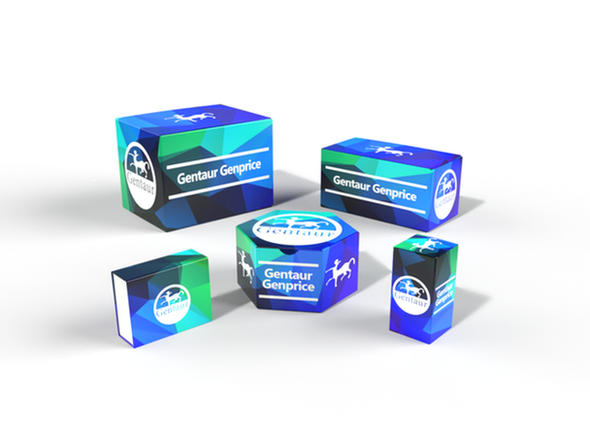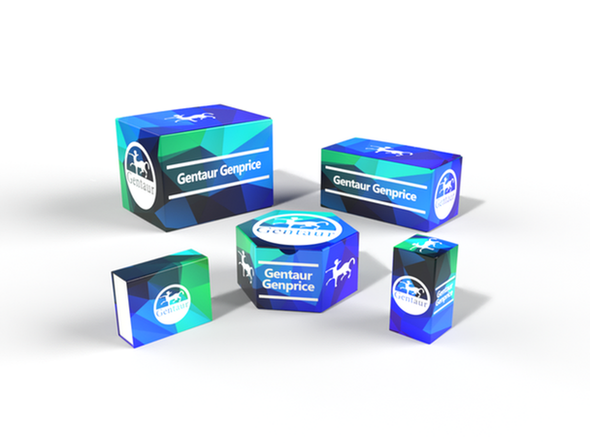Description
IL-1alpha Antibody [Bamboo-2] (biotin) | 36-166 | Gentaur UK, US & Europe Distribution
Host: Mouse
Reactivity: Mouse
Homology: N/A
Immunogen: Recombinant mouse mature IL-1alpha.
Research Area: Apoptosis, Immunology, Innate Immunity
Tested Application: E
Application: ELISA: (as a detection antibody) .
Specificiy: Recognizes mouse IL-1alpha.
Positive Control 1: N/A
Positive Control 2: N/A
Positive Control 3: N/A
Positive Control 4: N/A
Positive Control 5: N/A
Positive Control 6: N/A
Molecular Weight: N/A
Validation: N/A
Isoform: N/A
Purification: >95% (SDS-PAGE)
Clonality: Monoclonal
Clone: Bamboo-2
Isotype: IgG1, kappa
Conjugate: Biotin
Physical State: Liquid
Buffer: Liquid. In PBS containing 0.02% sodium azide.
Concentration: 1 mg/ml
Storage Condition: Stable for at least 1 year after receipt when stored at -20˚C.
Alternate Name: Interleukin-1alpha
User Note: Optimal dilutions for each application to be determined by the researcher.
BACKGROUND: The most prominent members of the interleukin-1 (IL-1) superfamily are IL-1alpha and IL-1beta. They lack a signal peptide and are secreted by an unconventional, endoplasmic reticulum-Golgi-independent mechanism. IL-1alpha was reported to be more widely and constitutively expressed and has intracellular functions, but also acts locally in a membrane-bound form by activating IL-1R1. Additionally, passive release of IL-1alpha upon cell death can trigger a sterile inflammatory response to dying cells. The cleavage of IL-1alpha is not mediated by caspase-1 and is not required for binding to IL-1R1. Recently it has been observed that all activators of the inflammasome NLRP3/NALP3 induce the simultaneous secretion of IL-1alpha and IL-1beta. Although most activators fully rely on the inflammasome for IL-1alpha secretion, some induce the processing and secretion of IL-1alpha in an inflammasome-independent manner.

![IL-1alpha Antibody [Bamboo-2] (biotin) IL-1alpha Antibody [Bamboo-2] (biotin)](https://cdn11.bigcommerce.com/s-1rdwiq712m/images/stencil/608x608/products/462282/468111/gentaur-genprice__26005.1661610467__29809.1661628092__75433.1661676199__77988.1661684280__64362.1661692443__02085.1662049603__45075.1662119302__91744.1662191540__21580.1662291419__70198.1663495051.png?c=1)
![IL-1alpha Antibody [Bamboo-2] IL-1alpha Antibody [Bamboo-2]](https://cdn11.bigcommerce.com/s-1rdwiq712m/images/stencil/590x590/products/462281/468110/gentaur-genprice__26005.1661610467__29809.1661628092__75433.1661676199__77988.1661684280__64362.1661692443__02085.1662049603__45075.1662119302__91744.1662191540__21580.1662291419__04176.1663495051.png?c=1)
![IL-1alpha Antibody [Bamboo-1] IL-1alpha Antibody [Bamboo-1]](https://cdn11.bigcommerce.com/s-1rdwiq712m/images/stencil/590x590/products/462277/468106/gentaur-genprice__26005.1661610467__29809.1661628092__75433.1661676199__77988.1661684280__64362.1661692443__02085.1662049603__45075.1662119302__91744.1662191540__21580.1662291419__73461.1663495050.png?c=1)






